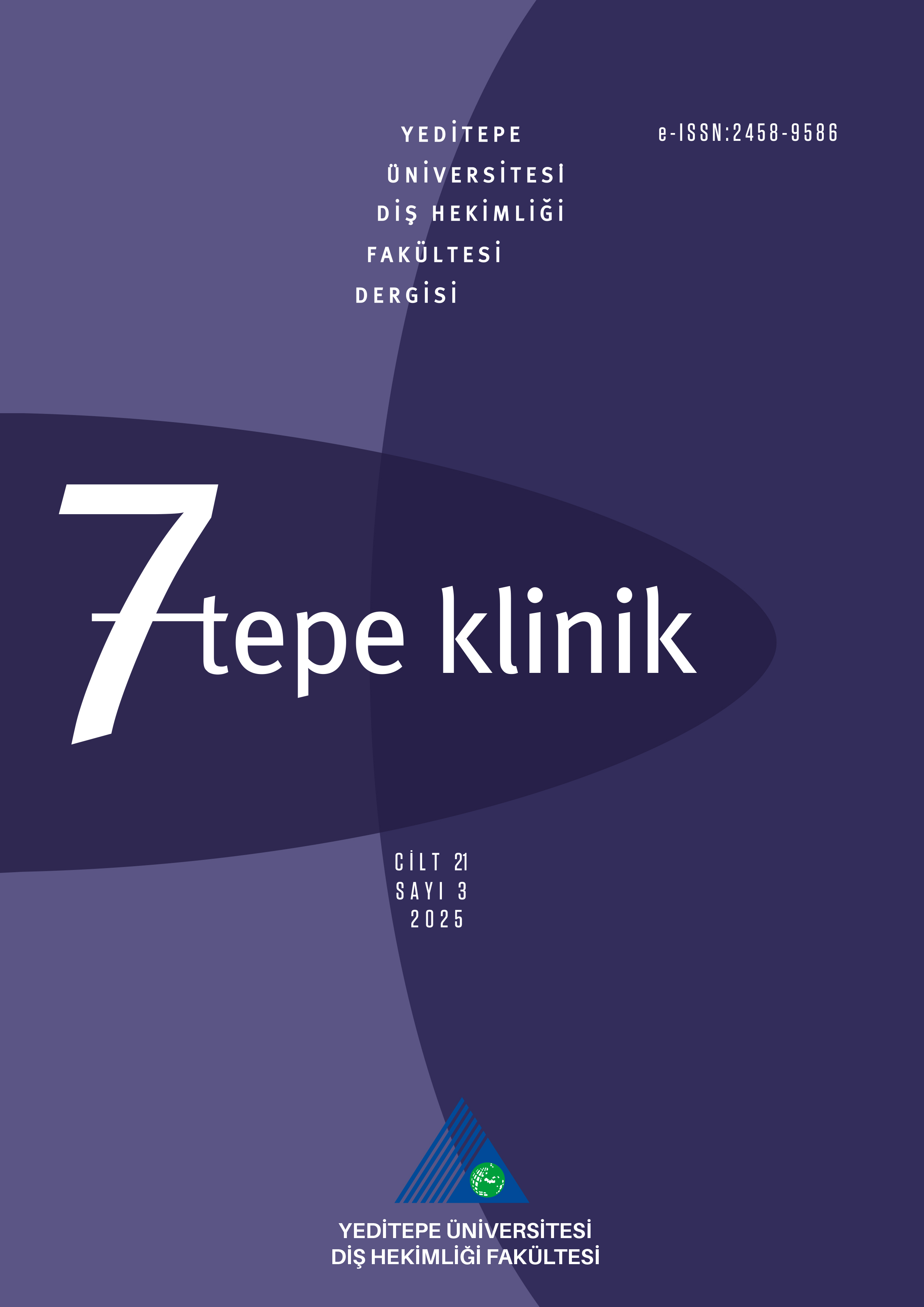Dental implant cerrahisinde preoperativ ve postoperativ anksiyete durumunun değerlendirilmesi
Ulviyya Mammadova, Kemal YamalıkGazi Universitesi Diş Hekimliği Fakultesi, Ağız Diş Çene Hastalikları A.D., Ankara, TürkiyeGİRİŞ ve AMAÇ: Dental fobi dental implant cerrahisi için kontreendikasyon oluşturmamaktadır. Dental implant cerrahisi psikolojik ve fiziyolojik etkileri sonucunda nadiren heyati tehlike oluşturan, son der-cede stressli bir işlem olarak algılanan, uygulanması kolay ve iyileşme süresi kısa süren işlemler-dendir. Dolayısı ile bu işlemlerde hastalarda oluşan anksiyete daha ilgincdir. Çalışmanın amacı, dental implant cerrahisi uygulanan hastaların preoperatif ve postoperatif anksiyete durumunun değer-lendirilmesi ve cinsiyetin, yaşın, sosyodemografik faktörlerin, yapılacak dental implantın anatomik bölgesinin, tek implant, birden fazla implant ve implanta ek olarak sinus lift gibi durumların anksiye-te değeri üzerine etkisini araştırmaktır.
YÖNTEM ve GEREÇLER: Bu çalışmaya, dental implant cerrahisi planlanan yaşları 18 ila 70 arasında değişen 59 kadın, 42 erkek toplam 101 hasta dahil edilmiştir. Hastaların anksiyete seviyyesini değer-lendirmek için Durumluluk-Sürekli Kaygı Envanteri (STAI-I ve STAI-II), kullanılmıştır.
BULGULAR: Çalışmaya katılan hastalarda preoperatif ve postoperatif anksiyete durumu karşılaştırıldığında preoperatif aşamada tüm hastaların kaygı seviyelerinin yüksek olduğu gözlemlenmiştir. Yaş, cinsiyet, sistemik hastalıkların varlığı ile dental kaygı arasında anlamlı ilişki saptanmamıştır (p>0,05). Bununla birlikte; eğitim durumu ile dental anksiyete arasında ilişki oldugu tespit edilmiştir (p<0.05).
TARTIŞMA ve SONUÇ: Bu çalışmada dental anksiyete gelişimini önlemede, en önemli faktörlerden birinin eğitim düzeyinin yükseltilmesi olduğu saptanmıştır. Hastaların minimum anksiyete seviyesinde tutulması işlemin hekim ve hasta için daha rahat gerçekleştirilmesini sağlayacaktır.
Anahtar Kelimeler: Dental anksiyete, dental implant, STAI
Assessment of preoperative and postoperative anxiety in patients who undergo surgical procedures for tooth implants
Ulviyya Mammadova, Kemal YamalıkGazi University Faculty of Dentistry Department of Oral And Maxillofacial Surgery, Ankara, TurkeyINTRODUCTION: Dental phobia is not a contraindication for oral implant therapy. The physical and, above all, psychological effects result in implant surgery being perceived as an extremely stressful experience, although such procedures are rarely life threatening, and recovery time is relatively short. Therefore, the question for the genesis and high prevalence of dental anxiety becomes even more interesting. The aim of this study, to compare statistically the anxiety level of patients who is planning to have dental implant surgery by their demographic features; numbers of dental implants; anatomic region; preoperative & postoperative evaluation done by the surgeon.
METHODS: There were 101 otherwise healthy patients included, 59 women, 42 men in between the age of 18 to 70 years old. İn this study to evaluate anxiety using the State-Trait Anxiety Inventory (STAI-I and STAI-II) who underwent surgical procedures for dental implants.
RESULTS: The results show that preoperative anxiety level were significantly high compare to posto-perative stage. Dental anxiety was not related to age, gender, sistemic diaseas (p>0,05). However, there was a relationship between education status and dental anxiety (p<0.05).
DISCUSSION AND CONCLUSION: In this study, it was ascertained that enhancing the educational level is one of the sig-nificant factors to prevent the dental anxiety development. Maintaining minimum levels of anxiety provides procedures to be more comfortable both for the patient and for the surgeon.
Keywords: Dental anxiety, dental implant, STAI
Makale Dili: Türkçe



